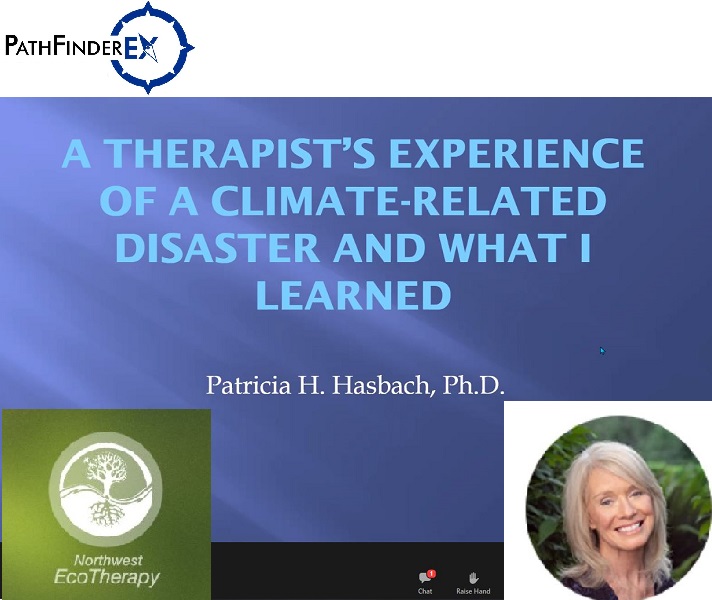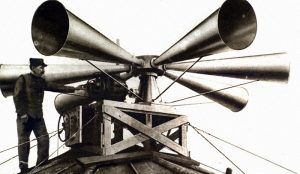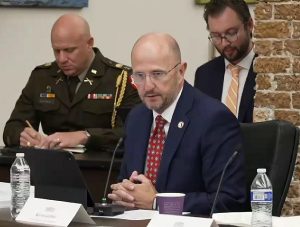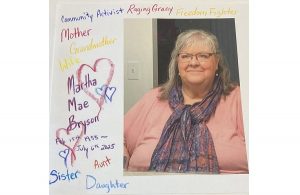Preparing for ‘solastalgia’ and other psychological effects of disaster
6 min read
Dr. Patricia Hansbach shared lessons from her work with fellow survivors of the Holiday Farm Fire.
You can prepare for the psychological impacts of a disaster. From the January PathfinderEX Summit, co-founder Kevin Lindsey.
[00:00:07] Kevin Lindsey: My name is Kevin Lindsey. I’m a co-founder and Director of Operations for PathfinderEX and when I’m not volunteering for PathfinderEX, I’m a Deputy Operations Chief for Mass Care for the State of Oregon.
[00:00:18] Dr. Patricia Hasbach is a psychotherapist and consultant who’s going to be talking to us about really kind of the lived experience and impact of surviving a catastrophe, some of the anxiety that goes along with preparedness and some of the barriers that people face. So we’re excited to have her here and thank you, Dr. Hasbach.
[00:00:35] Dr. Patricia Hasbach: Thank you, Kevin. I’m going to share my story of being a survivor of the Holiday Farm Fire and what I learned about the psychological impact of that disaster through working as a professional psychotherapist with my patients, many of whom were also survivors of the fire.
[00:00:55] There are a lot of losses involved in a disaster, perhaps their home, perhaps even their livelihoods, perhaps loss of life of someone they knew, lots of animals. There’s a loss of this sense of place and sense of belonging. We have a name for the sense of losing a beloved place: It’s called ‘solastalgia.’ It’s sort of like a homesickness. Even though the place still exists, it may be unrecognizable.
Thank you for supporting
local citizen journalism
[00:01:25] People experience a sense of vulnerability. We come face to face with the fact that there’s a lot it’s out of our control. Many people experience fear and anxiety that it could happen again and experienced the sense of overwhelm of the cleanup and the insurance claims and all that has to happen. For some it’s too much, and they decide not to rebuild or return. They also ask, ‘Where is safe?’
[00:01:51] Some people talked about experiencing survivor’s guilt, some express concern about sharing their experience with others that had had it so much worse. ‘ Why did my house survive and my neighbor’s house did not?’ Some talk about experiencing depression, a deep sense of sadness and feeling out of control. Many report brain fog, not being able to think clearly and remember accurately, and some experienced symptoms of post-traumatic stress disorder.
[00:02:20] Over time, the psychological work shifts from survival to recovery. They’re coming back, clearing out, rebuilding, and digging in. Many talked about building community, reaching out to others, expressing appreciation to the firefighters and first responders and volunteers. Many began extending kindness, or expressing their appreciation for kindness extended to them.
[00:02:46] Many began to consciously draw on their own inner strength and on the strength of their relationships and connection to others. It was the work of acceptance of the hard feelings, like fear and vulnerability. It was also feelings of empowerment to decide how to move forward and preparing for the next disaster.
[00:03:07] John Q: She said this experience helped her recognize barriers to preparedness.
[00:03:13] Dr. Patricia Hasbach: A parallel experience that many of us have had at some point in our life, putting off drawing up a will or creating a power of attorney legal document or writing our advance directives for medical purposes. It’s hard, emotional work, preparing for the loss of a beloved place or thinking about a disaster hitting our family and disrupting life. We know we should prepare, but we avoid it. We avoid the unthinkable. And as Kevin mentioned earlier, this is sense of overwhelm. Where do I start?
[00:03:44] We know that action is a strong antidote to worry and fear and depression and the goal of preparedness is to create that sense of agency and sense of empowerment. I can’t control whether a disaster’s going to happen, but I can choose how I’ll respond to it. This includes being as prepared as we can be.
[00:04:06] Discuss with your family: What are the disasters that are most likely to occur in your community? Create a disaster plan and practice it with your family. What are the escape routes in your house, on your property and in your community? Identify a meeting place near your home, and one outside the neighborhood and identify a contact person outside of the community that family members can check in with. If you get separated, have a survival kit, go bag packed, including first aid items, and items for kids and pets and prepare your children. Talk to them in an age- appropriate way about how we’re going to stay safe together, connect with others in your area to talk about community preparedness.
[00:04:51] John Q: From PathfinderEX, Dr. Oliver Wisco.
[00:04:54] Dr. Oliver Wisco: Dr. Hasbach, one of the questions that was put in the chat was, their response volunteers met yesterday and there was a lot of talk about staying put and just finding water. So in other words, not evacuating. How would you respond to that?
[00:05:07] Dr. Patricia Hasbach: Well, they would not have wanted to be in Blue River or (laughs) in the area of the fire. There’s the thought, ‘We could always boil water, we’re right here by the river.’ But when there’s such fast moving events that happen in disasters like the wildfire here, you wouldn’t want to stay put.
[00:05:27] I heard a story that they knew someone who did not want to evacuate and waited and waited and finally ended up having to run for his life and take a piece of foam and try to float down the river to escape the fires. It was so powerful. So I don’t think that staying in place would be something that I would want to do with this kind of a disaster,
[00:05:50] Dr. Oliver Wisco: Dr. Hasbach: Preparing is important, but it can also be a difficult conversation to have, especially with children. How do you prepare your family and practice your plans without scaring your children?
[00:06:00] Dr. Patricia Hasbach: That’s a great question, Oliver, and I think it’s important to remember that as parents, it’s our responsibility to lead by example, and preparation is the best way to handle difficult situations. So it’s important that we talk to our kids. Information about natural disasters should come from you, from the parents, not from the media. And when we’re talking about a severe weather related event or some other natural disaster, it’s important to stay calm. Provide age appropriate information and details to them. They may have questions and answer their questions honestly. And depending on their age plan to have a series of shorter conversations about it.
[00:06:45] In thinking about getting prepared it’s important to have kids involved in creating a go bag for themselves. So you talk to your kids about what do they need and use every day and ask them what they’d like to have with them if they have to leave home. Their checklist should include some comfort items like stuffed animals. If they’re young games, some familiar items to help maintain some sense of normalcy for them. And it’s important to remember to update those checklists every year as their comfort items will likely change as they get older.
[00:07:19] It’s important to develop an evacuation plan that instructs everybody how to safely exit the home and be sure that kids know where to go. What’s a meeting place in the event that people would get separated and who should they contact?
[00:07:35] I think it’s important that we practice disaster drills. When we practice what to do in an event of a disaster, it will help comfort kids if a real disaster occurs. And many children today are having this experience at school, so it may not be so strange to them to think about practicing for a disaster at home.
[00:07:58] I think it’s really important to remember kids look to their parents for comfort and support. If there is a disaster first to calm yourself and talk to them about what happened and address their feelings and concerns. Making space for that, like so many times parents are asked to give the most when we may have the least to give with all the things that have to happen. But being there for your kids, seeing them strong and confident if they see you strong confidence, they’re going to feel a lot safer.
[00:08:30] John Q: Prepare to first take care of yourself, then your family, and then your neighbors.




